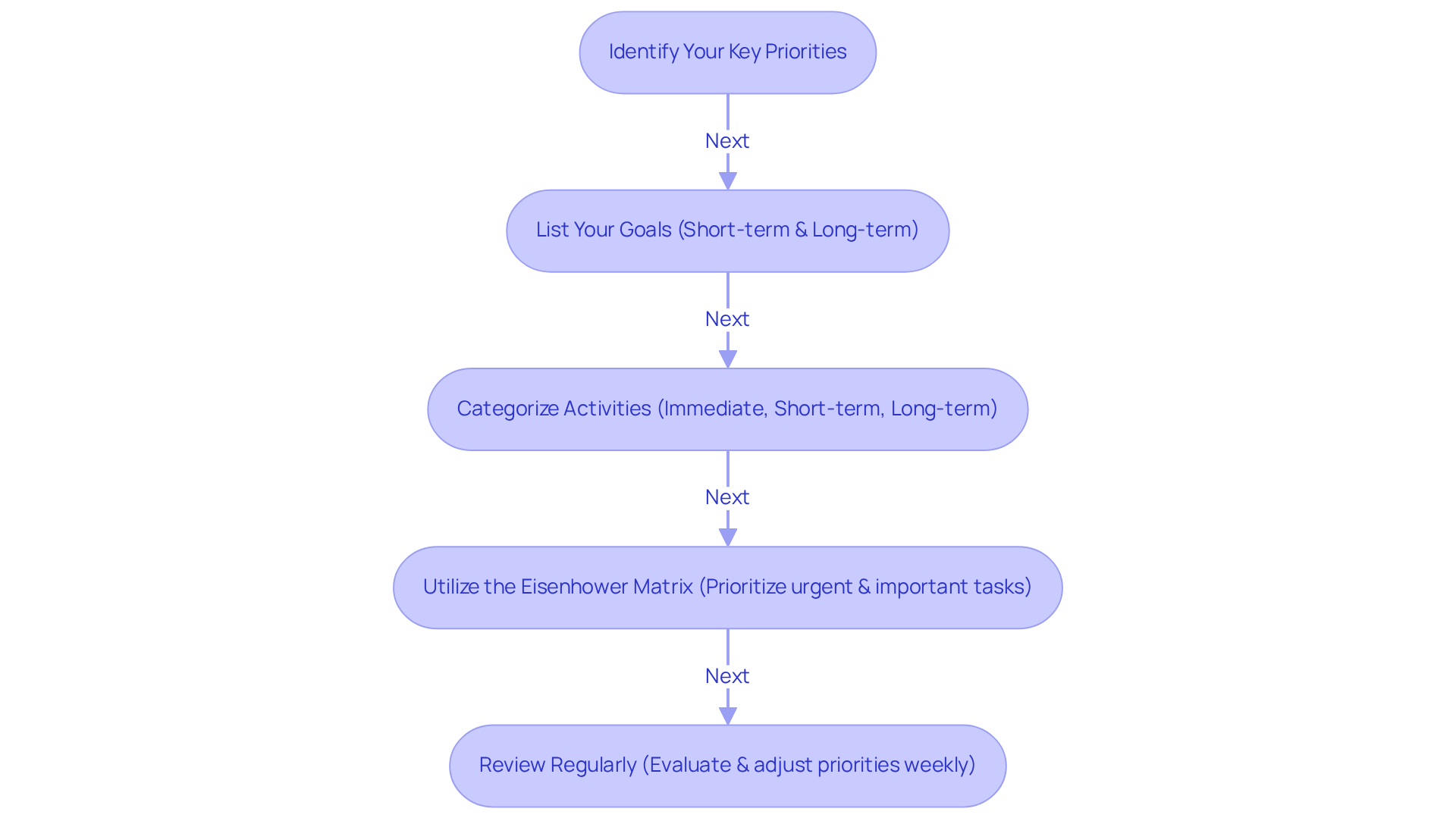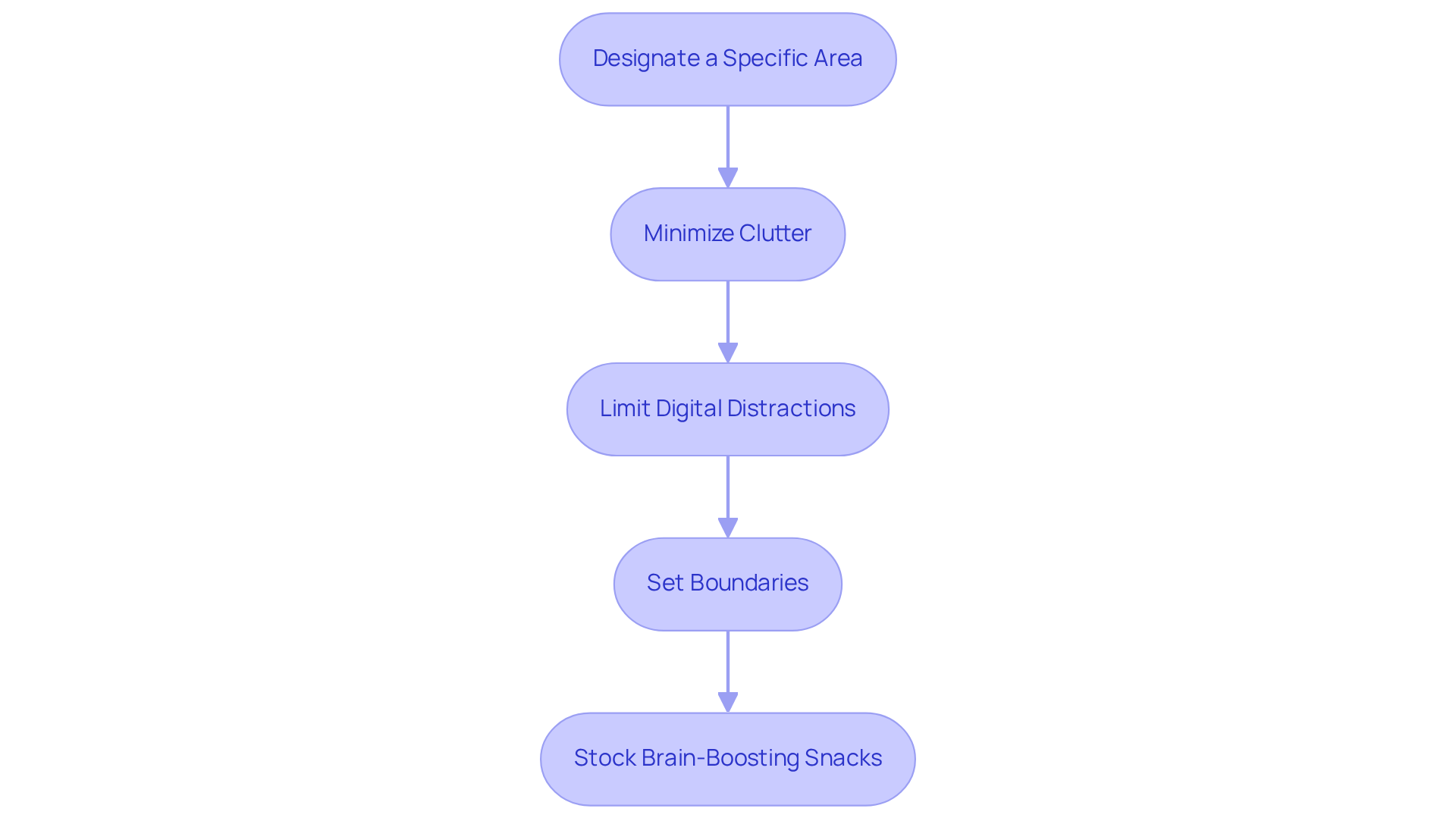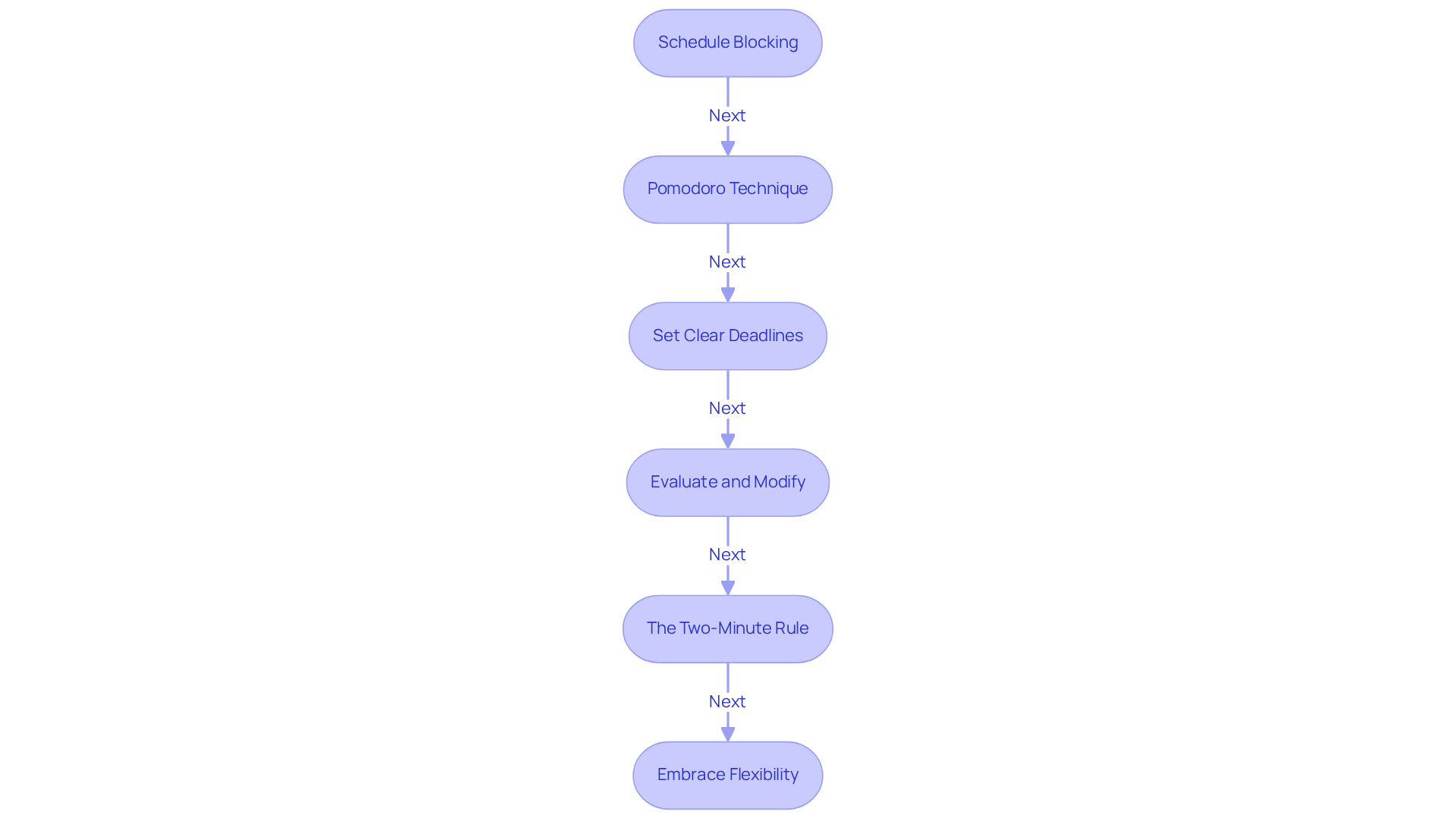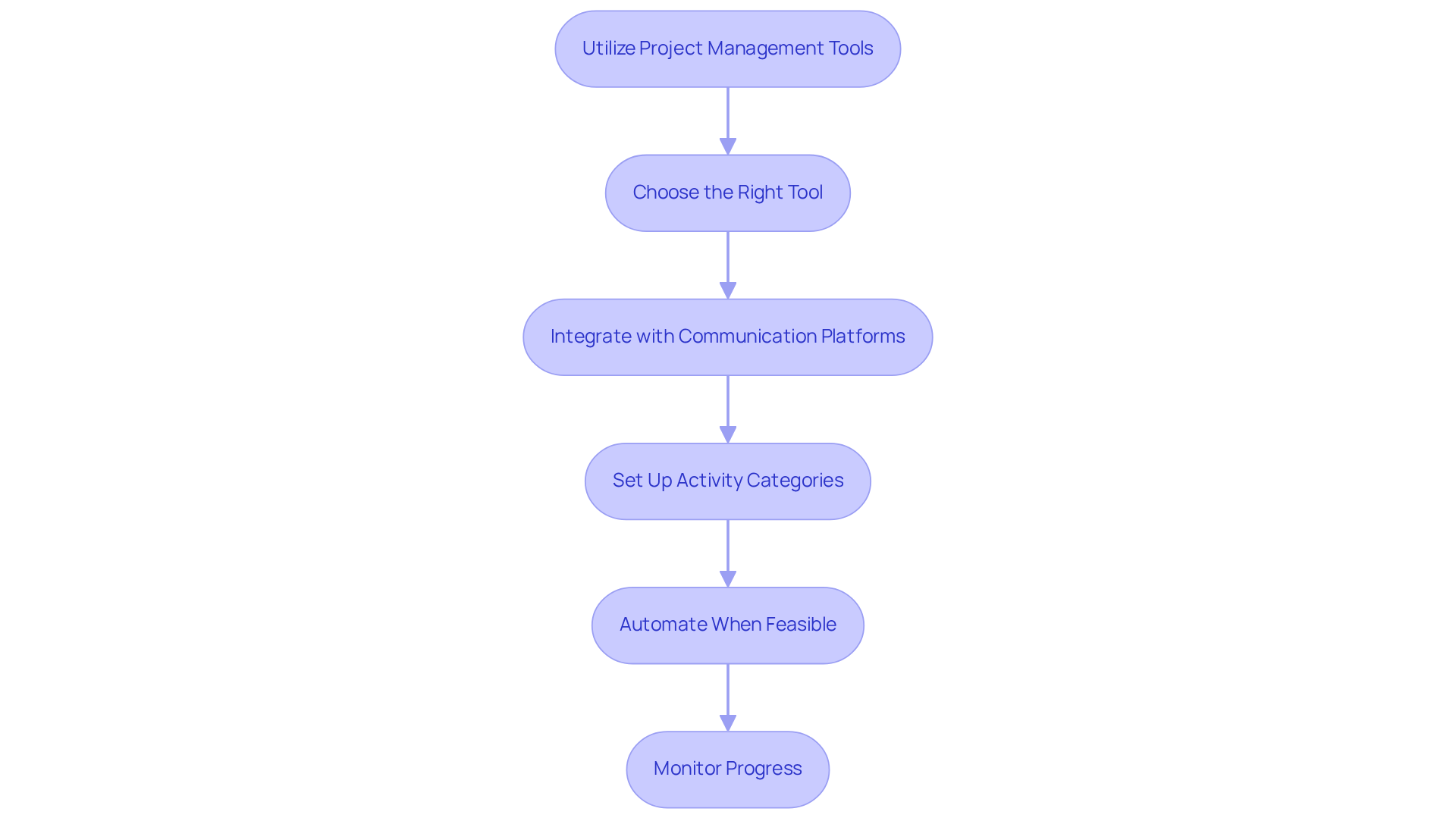Overview
The article outlines four essential steps for startup founders to maintain focus in their work:
- Identifying key priorities
- Establishing a distraction-free workspace
- Implementing effective time management techniques
- Utilizing project management tools
Why is this important? These strategies not only enhance productivity but also help founders navigate the unique challenges of startup environments.
To support these strategies, practical methods such as:
- Goal setting
- Workspace organization
- The Pomodoro Technique
- Automation
are recommended. Each method is designed to foster an environment conducive to concentration. For instance, how can goal setting transform your daily workflow? By clearly defining objectives, you can prioritize tasks effectively and reduce overwhelm.
Moreover, organizing your workspace minimizes distractions, allowing you to immerse yourself fully in your work. The Pomodoro Technique introduces structured breaks, enhancing focus and preventing burnout. Lastly, automation can streamline repetitive tasks, freeing up valuable time for strategic thinking and innovation.
In conclusion, by adopting these four essential steps, startup founders can significantly enhance their productivity and maintain concentration amidst the ever-evolving challenges of their environments. Are you ready to implement these strategies and take your startup to the next level?
Introduction
Startup founders frequently find themselves juggling numerous responsibilities, making focus a precious commodity. By zeroing in on key priorities and establishing a structured work environment, entrepreneurs can significantly boost their productivity and propel their ventures toward success. Yet, with myriad distractions clamoring for attention, how can founders sustain their concentration and navigate the tumult of startup life? This article explores practical steps that empower founders to remain focused, optimize their time management, and cultivate a distraction-free workspace, ultimately laying the groundwork for sustained growth and achievement.
Identify Your Key Priorities
-
List Your Goals: Begin by articulating your short-term and long-term goals. These may encompass revenue targets, product launches, or team expansions. Establishing precise and quantifiable objectives equips your team with a clear direction, which is vital for startup success.
-
Categorize Activities: Decompose your goals into actionable steps. Organize them into categories such as 'Immediate', 'Short-term', and 'Long-term'. This structured approach helps you understand how to stay focused at work and boosts productivity.
-
Utilize the Eisenhower Matrix: Leverage this prioritization tool to distinguish between urgent and important activities. Prioritize tasks that are both urgent and significant. It’s noteworthy that a considerable percentage of startup founders employ the Eisenhower Matrix for effective prioritization, highlighting its importance in task management.
-
Review Regularly: Set aside time each week to evaluate and adjust your priorities based on progress and changing circumstances. This routine not only keeps you aligned with your goals but also cultivates a culture of adaptability within your team. Remember, achieving goals generates a positive feedback loop of success, inspiring your team to persist in their pursuit of excellence.

Establish a Distraction-Free Workspace
-
Designate a Specific Area: Establish a dedicated workspace solely for work-related activities. This physical separation fosters a mental boundary, which is essential for learning how to stay focused at work. A clearly defined space signals to your brain that it's time to concentrate, ultimately enhancing your efficiency.
-
Minimize Clutter: Maintain an organized workspace free from unnecessary items. A tidy environment reduces distractions and promotes clarity of thought. Research indicates that understanding how to stay focused at work through an organized workspace significantly improves concentration and productivity, allowing you to engage more fully with your tasks.
-
Limit Digital Distractions: Combat digital interruptions by employing tools like website blockers and disabling non-essential notifications on your devices. Studies reveal that recovering attention after a distraction takes an average of 23 minutes and 15 seconds. Thus, it's crucial to create a digital environment that shows employees how to stay focused at work. Techniques like the Pomodoro Technique—working in focused bursts followed by short breaks—can effectively maintain your concentration.
-
Set Boundaries: Clearly communicate your work hours to those around you, emphasizing the need to minimize interruptions during these periods. Establishing boundaries is essential for understanding how to stay focused at work, as it protects your concentration and fosters respect for your work commitments, enhancing overall productivity. Additionally, stocking your desk with brain-boosting snacks can sustain your energy levels and focus throughout the day.

Implement Time Management Techniques
-
Schedule Blocking: Assign specific time segments for various activities or projects. This strategy demonstrates how to stay focused at work by promoting concentrated focus on a single task and minimizing the distractions of multitasking. By defining time limits, you create uninterrupted intervals that enhance efficiency. Moreover, leaving about 20% of your day unplanned allows for the management of unforeseen tasks or overruns.
-
Pomodoro Technique: Engage in focused work sprints of 25 minutes, followed by a 5-minute break. This method not only sustains high levels of concentration but also teaches you how to stay focused at work by organizing your tasks into manageable intervals to counter procrastination. Adopting this technique can significantly boost your overall productivity.
-
Set Clear Deadlines: Establish timelines for each assignment to instill a sense of urgency and accountability. By prioritizing tasks using frameworks like the Eisenhower Matrix, you will discover how to stay focused at work, ensuring that critical issues are promptly addressed and enhancing your efficiency in managing responsibilities. The Eisenhower Matrix categorizes tasks into four quadrants based on urgency and importance, guiding you to focus on what genuinely matters.
-
Evaluate and Modify: At the end of each week, take a moment to reflect on how you utilized your hours and adjust your strategies as needed. This reflective practice enables you to pinpoint time-wasting activities and inefficiencies, fostering continuous improvement in your time management approach. Remember to incorporate self-care practices, such as regular exercise and adequate sleep, to sustain your productivity and overall well-being.
-
The Two-Minute Rule: If a task requires less than two minutes to complete, tackle it immediately rather than adding it to your to-do list. This quick win helps you manage minor responsibilities efficiently, keeping your workload manageable.
-
Embrace Flexibility: As a startup founder, adaptability is crucial. Uncertainties are inevitable, and being willing to adjust your schedule can enhance your ability to navigate challenges effectively. Consider leveraging automation tools like Zapier or IFTTT to streamline workflows and reduce manual effort, allowing you to focus on more significant responsibilities.

Utilize Project Management Tools
-
Choose the Right Tool: Selecting a project management tool that aligns with your team's specific needs is crucial. Casy, for example, efficiently oversees responsibilities and boosts productivity by lowering administrative overhead.
-
Integrate with Communication Platforms: Opt for tools that seamlessly integrate with your existing communication platforms, such as Slack or Telegram. This integration simplifies the creation and updates of activities, enabling teams to transform conversations into actionable items. The recent trend of integrating project management tools, exemplified by Slack's introduction of Lists, enables users to manage projects directly within the platform, enhancing collaboration and accountability.
-
Set Up Activity Categories: Organizing activities into clear categories like 'To Do', 'In Progress', and 'Completed' is essential for maintaining visibility and accountability. This organized method guarantees that team members can effortlessly monitor progress and prioritize deliverables, tackling the frequent issue of workload overload.
-
Automate When Feasible: Utilize automation capabilities to reduce manual input and concentrate on strategic activities. Tools like Casy automate routine updates and task creation, significantly reducing coordination costs and enhancing overall productivity. By automating these processes, teams can maintain alignment on projects without the inefficiencies of switching between multiple applications. Notably, only 34% of projects are completed on time and within budget, underscoring the importance of effective automation.

Conclusion
Staying focused at work is essential for startup founders navigating the complex and often unpredictable landscape of entrepreneurship. By implementing structured strategies—such as:
- Identifying key priorities
- Creating a distraction-free workspace
- Managing time effectively
- Utilizing project management tools
founders can enhance their productivity and drive their ventures towards success.
Key insights discussed in this guide highlight the importance of:
- Setting clear goals
- Organizing tasks
- Regularly reviewing progress to maintain focus
Establishing a designated workspace and minimizing distractions—both physical and digital—further supports a conducive environment for concentration. Additionally, employing time management techniques like the Pomodoro Technique and the Two-Minute Rule can significantly boost efficiency. The strategic use of project management tools can streamline operations and foster collaboration within teams.
Ultimately, the ability to stay focused is not just a personal skill; it is a critical component of a startup's success. By prioritizing focus and implementing these actionable strategies, founders can create a thriving work environment that not only supports their personal productivity but also inspires their teams to achieve collective goals. Taking these steps can lead to more effective decision-making, improved team dynamics, and ultimately, a more successful startup journey.
Frequently Asked Questions
What is the first step in identifying key priorities for a startup?
The first step is to list your goals, which should include both short-term and long-term objectives such as revenue targets, product launches, or team expansions.
How should activities be organized to support goal achievement?
Activities should be decomposed into actionable steps and organized into categories such as 'Immediate', 'Short-term', and 'Long-term' to help maintain focus and boost productivity.
What is the Eisenhower Matrix and how can it be used?
The Eisenhower Matrix is a prioritization tool that helps distinguish between urgent and important activities. It encourages prioritizing tasks that are both urgent and significant, which many startup founders find effective for task management.
Why is it important to review priorities regularly?
Regularly reviewing priorities allows you to evaluate and adjust based on progress and changing circumstances, keeping you aligned with your goals and fostering a culture of adaptability within your team.
What is the impact of achieving goals on a startup team?
Achieving goals generates a positive feedback loop of success, which inspires the team to persist in their pursuit of excellence.




